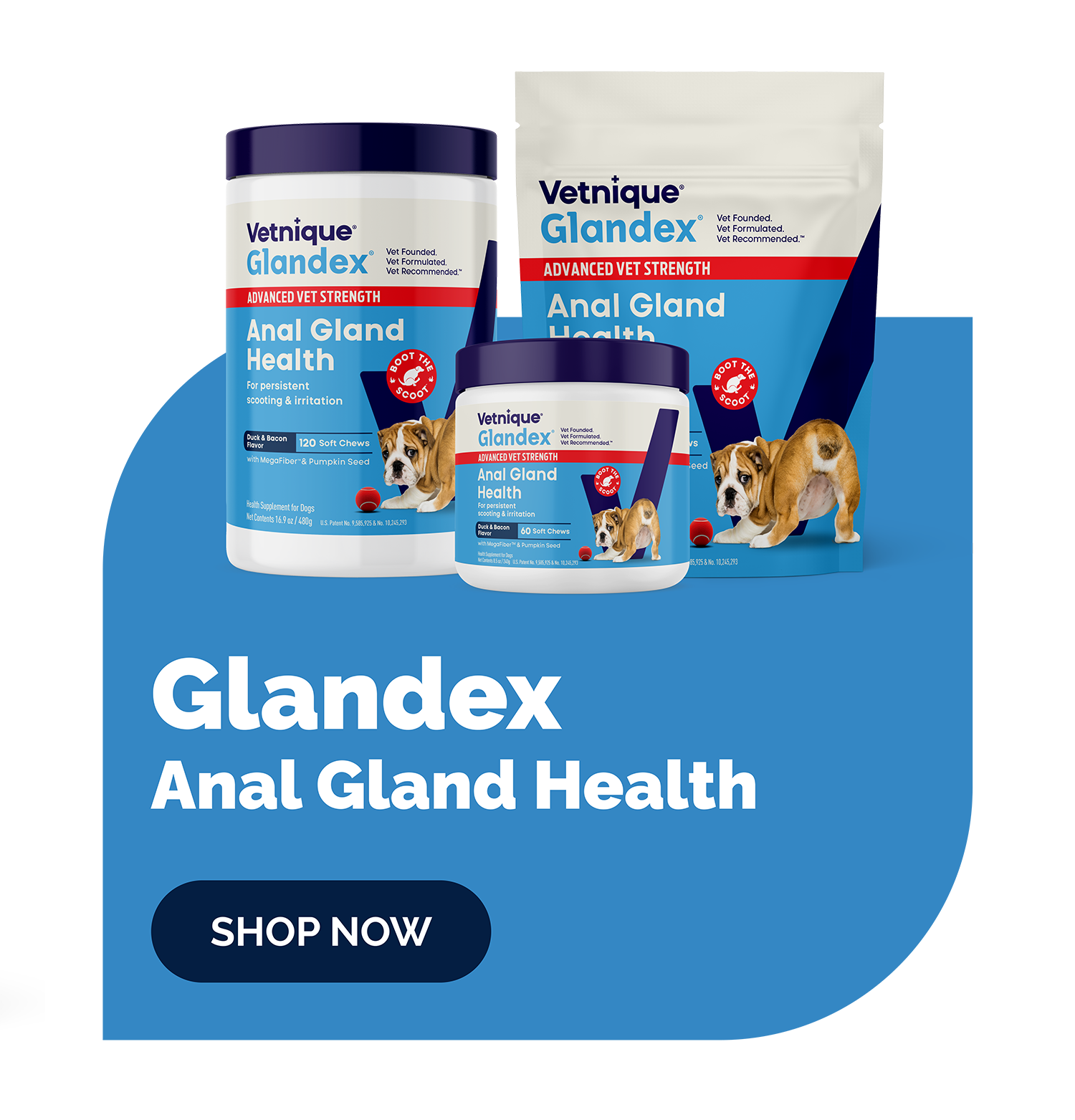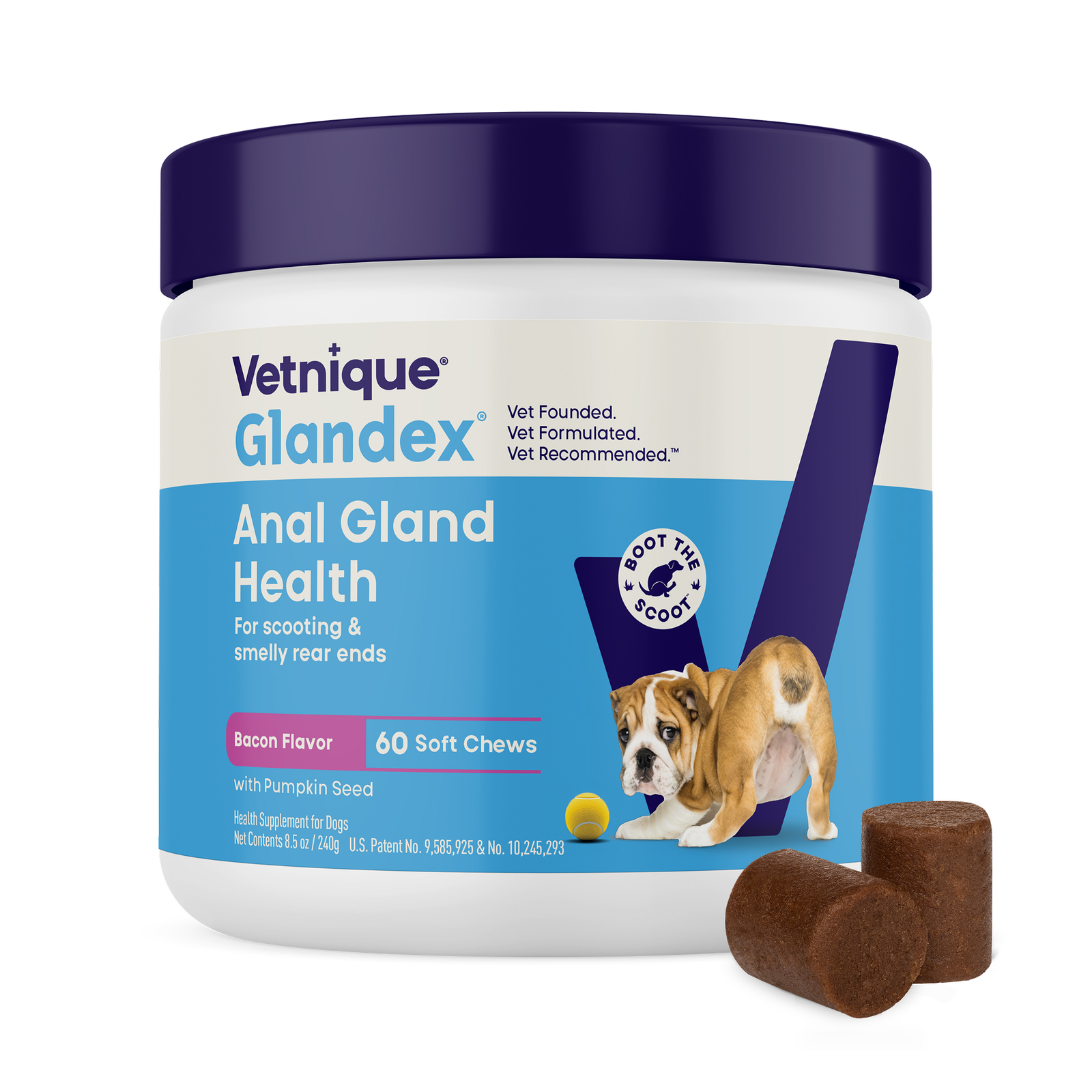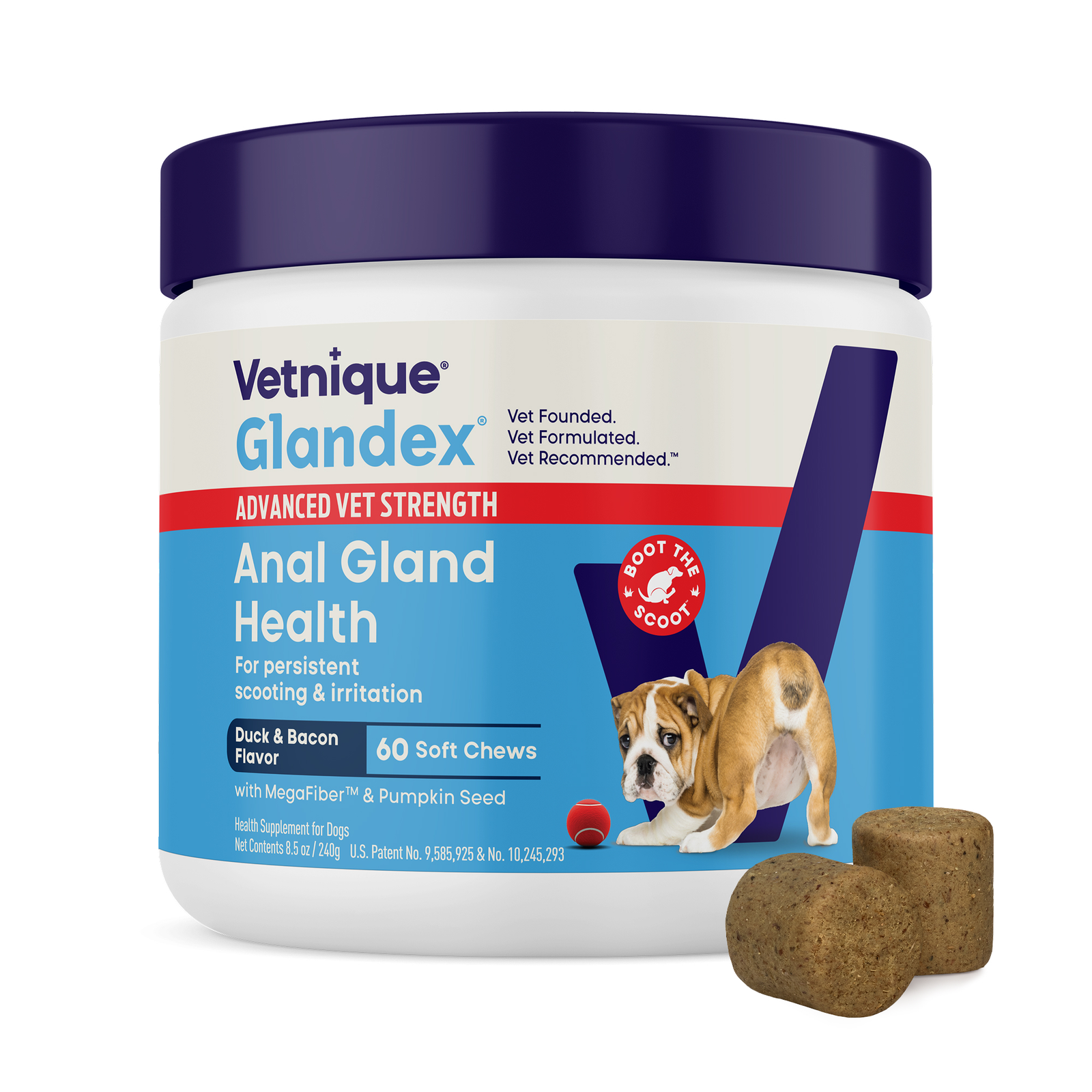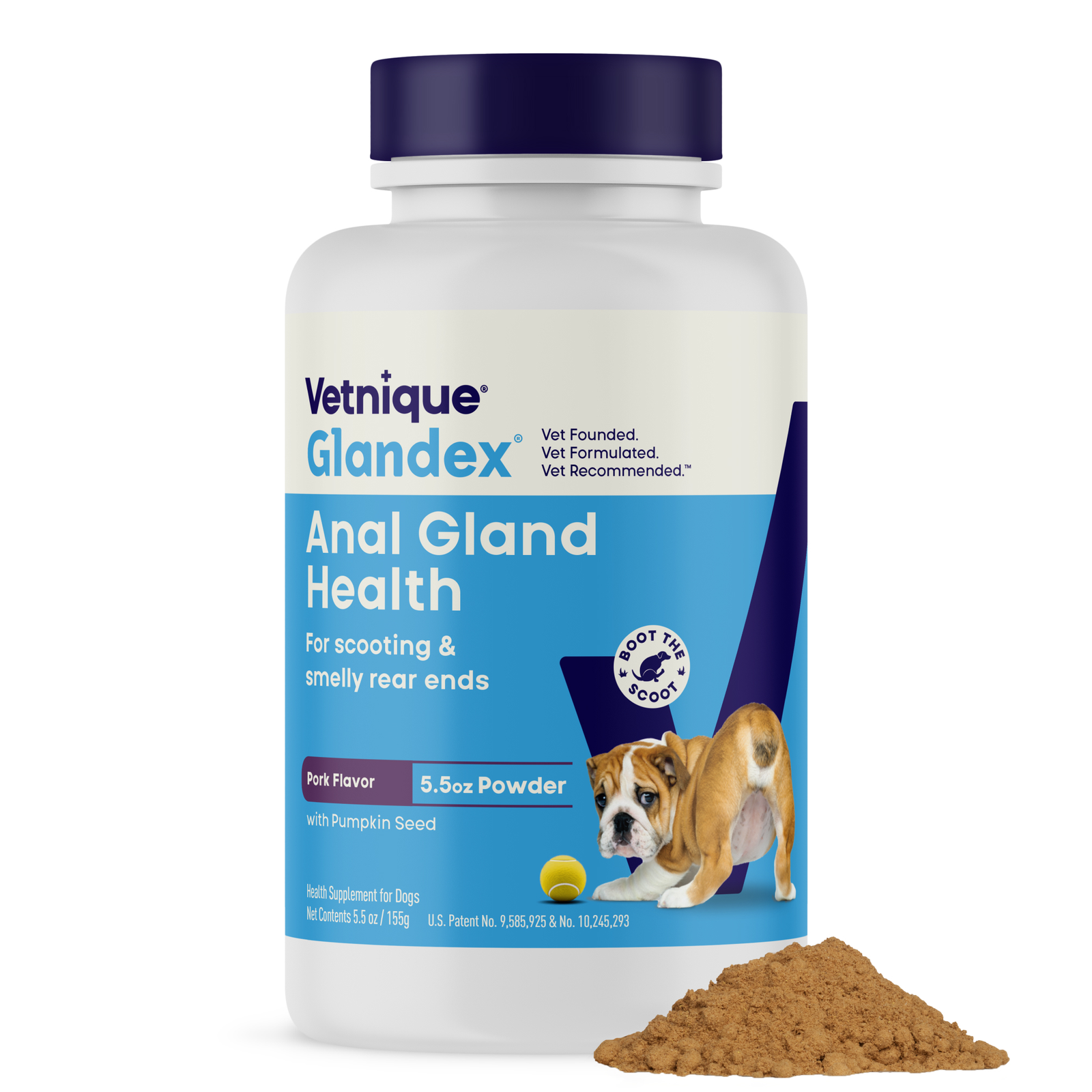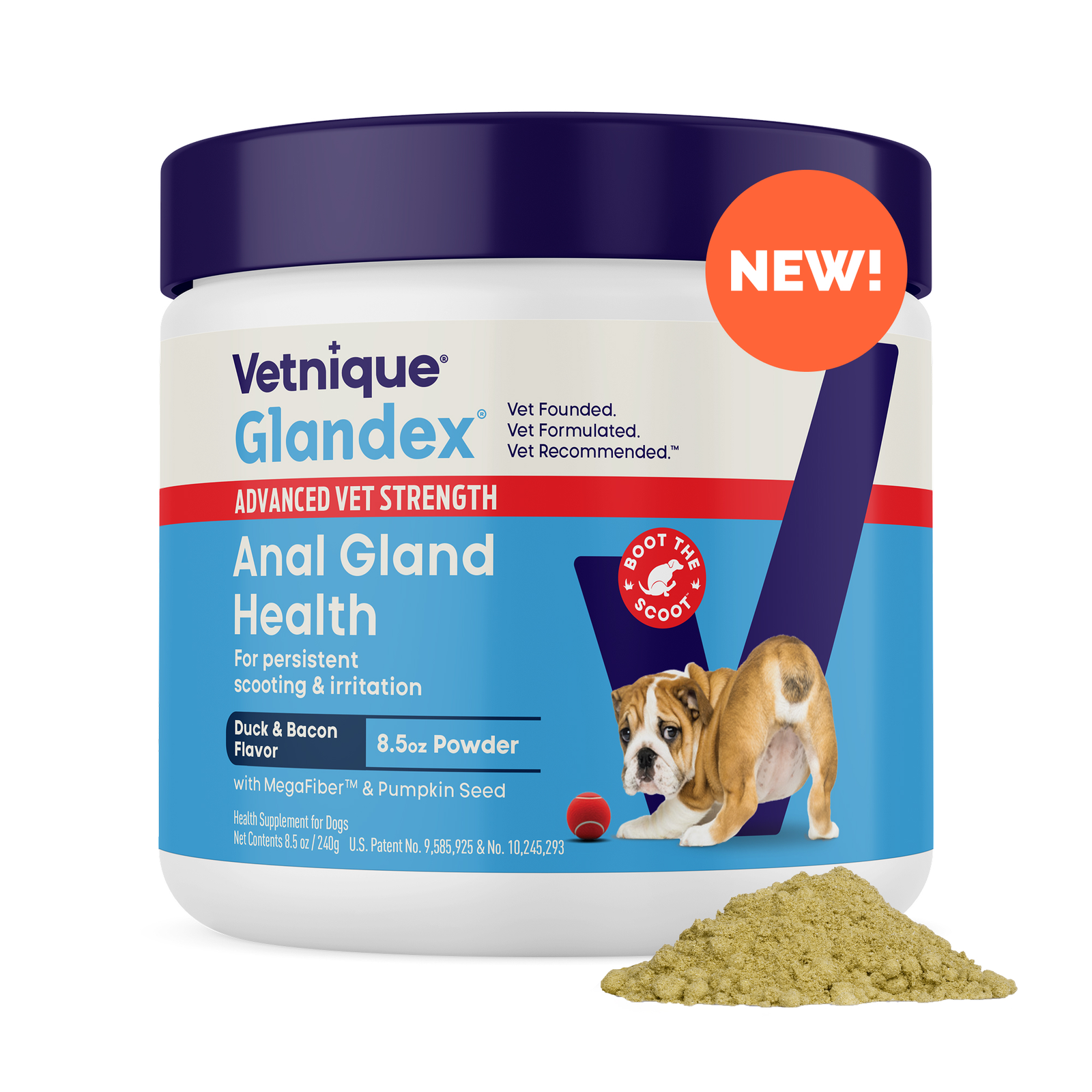Why Is My Dog Scooting? Tips For Relief
Vet Verified
WRITTEN BY DR. PATRICK MAHANEY

Are you puzzled by your furry friend's scooting habit? Seeing your dog dragging their bottom on the ground might look funny, but the potential health issues behind it can be anything but. We’ll explore the reasons behind this behavior, and explore effective ways to offer your canine relief.
Why do dogs scoot their bottoms on the ground?
Scooting might look funny, but in reality it’s an indirect sign that something is amiss with your dog’s health. If your dog is scooting, one of these reasons could be to blame:
Full Anal Glands or Anal Gland Issues
One of the primary reasons dogs scoot is due to full anal glands or anal gland issues. These glands, located near the anus, are responsible for secreting a small amount of fluid during bowel movements. However, if the glands become blocked or infected, they can cause discomfort and the urge to scoot. Some dogs may naturally express their anal glands during bowel movements, while others may require manual expression by a veterinarian.
To determine if full anal glands are the cause of your dog's scooting, observe any other symptoms such as licking or chewing at the base of the tail or foul odor around the anus. A visit to the vet can confirm the diagnosis and provide relief through anal gland expression, where the accumulated fluid is gently expelled via digital rectal exam. This is the safest approach to fully assessing and managing anal gland issues.
allergies
Allergies can contribute significantly to dog scooting behavior. Environmental allergens like pollen, dust mites, or mold, as well as food, flea/biting insects, and other allergies, can cause skin irritation and itching in dogs. When the anal area becomes itchy and uncomfortable, dogs may resort to scooting as a way to relieve the itching sensation.
Identifying and managing allergies is crucial in addressing dog scooting. Your vet may recommend allergy testing to pinpoint specific allergens triggering your dog's symptoms. Implementing allergy management strategies such as hypoallergenic diets, allergy shots, or environmental controls can help reduce scooting episodes.
parasites
Parasites, such as tapeworms, can lead to dog butt scooting. Parasites can cause irritation and inflammation around the anus, prompting your dog to drag their bottom on the ground to alleviate the discomfort. Fecal parasite testing and control treatments prescribed by your vet can help prevent infestations and reduce scooting incidents.
Regular fecal parasite screenings and deworming protocols are essential to maintain your dog's overall health and prevent scooting caused by worms or parasites. Your vet can recommend the appropriate parasite control products based on your dog's age, lifestyle, and risk factors.
Digestive Irritation
Digestive issues such as diarrhea or constipation can also contribute to dog scooting. When dogs experience gastrointestinal discomfort, they may exhibit scooting behavior in an attempt to relieve the discomfort or pressure in their abdomen. Addressing underlying digestive issues through proper diet, hydration, and veterinary guidance can help reduce scooting incidents.
Ensuring your dog receives a balanced diet with adequate fiber and hydration is crucial for maintaining healthy digestion and minimizing scooting episodes. Consult with your vet if your dog experiences frequent digestive issues or scooting behavior to rule out any underlying health concerns.
Skin Irritation, Scratch, or Swelling
Skin irritation, scratches, or swelling in the anal area can cause dog scooting as well. External factors like rough surfaces, allergens, insect bites, or other factors can irritate the skin around the anus, prompting scooting behavior. Regular grooming, keeping the anal area clean, with a non-irritating cleansing wipe, and addressing any skin issues promptly can help prevent scooting due to skin irritation.
Inspecting your dog's skin regularly for signs of irritation, scratches, or swelling can help catch potential scooting triggers early. Use gentle grooming products and avoid harsh chemicals that may further irritate sensitive skin. If skin issues persist, consult with your vet for appropriate treatment options.

What is the most common reason dogs drag their butt?
The most common reason dogs exhibit butt-dragging behavior is anal gland issues. These small glands, located just inside of and on the right and left sides of the anus, play a vital role in maintaining anal gland health. However, when the glands become clogged, infected, or inflamed, they can cause discomfort and the urge to drag the butt along the ground.
However, problems arise when these glands become blocked, infected, or inflamed. This can happen due to various reasons, including:
Soft Stool
Infection or Inflammation
Anal Gland Abscesses
Underlying Health Conditions
How to stop a dog from scooting
To help your dog stop scooting, it's essential to address the underlying cause:
Regular Anal Gland Expression
Your veterinarian can perform a digital rectal exam to safely express anal glands to relieve any buildup or blockages. This procedure should be done by a professional to avoid injury or discomfort.
Allergy Management
Identify and manage any allergies through proper diet and environmental controls. Consult with your vet for allergy testing and personalized management plans, such as dog allergy supplements or medication.
Parasite Testing & Control
Perform routine fecal parasite testing and administer parasite-control medications as recommended by your vet to prevent infestations and reduce scooting incidents.
Digestive Health
You can maintain your dog's digestive health with a balanced diet and daily probiotics, adequate hydration, and regular exercise. Address any digestive issues promptly with your veterinarian to prevent scooting due to gastrointestinal discomfort.
Skin Care
Keep the anal area clean, inspect for any skin issues, and use gentle grooming products to prevent scooting caused by skin irritation.
When to see a vet for a scooting dog
If your dog's scooting persists or is accompanied by other symptoms such as redness, swelling, licking, foul odor, vocalizing, behavior changes, or other signs of concern it's crucial to see a vet promptly. These could be signs of a more serious underlying issue such as infection, inflammation, or anal gland abnormalities that require professional evaluation and treatment.
While occasional scooting may not be a cause for immediate concern, certain signs and symptoms warrant prompt attention from a veterinarian. Here are key indicators of when to seek veterinary care for a scooting dog:
Persistent Scooting
If your dog is scooting frequently or persistently, it indicates an underlying issue that needs evaluation. Occasional scooting may be normal, but if it becomes a repetitive behavior, it's essential to investigate further.
Visible Discomfort
Watch for signs of discomfort or pain while your dog scoots. Whining, whimpering, or unusual vocalizations during scooting suggest that your dog may be experiencing significant discomfort or irritation.
Redness or Swelling
Examine your dog's anal area for redness, swelling, or irritation. These can be signs of inflammation, infection, or skin issues that require veterinary attention.
Foul Odor
A strong, unpleasant odor around the anal area may indicate anal gland issues, such as infection or abscess formation. Foul odor combined with scooting is a concerning sign that warrants immediate vet care.
Licking or Chewing
Excessive licking or chewing of the anal area can indicate discomfort or pain. It may also lead to irritation and inflammation if left untreated, further exacerbating the scooting behavior.
CHANGES IN STOOL
Pay attention to any changes in your dog's stool consistency or frequency. Diarrhea, constipation, or other bowel movement abnormalities can contribute to scooting behavior and may indicate underlying digestive issues.
Presence of Blood
If you notice blood in your dog's stool, on their fur around the anus, or on surfaces where they scoot, it's a sign of potential injury, inflammation, or internal issues that require immediate veterinary assessment.
Behavioral Changes
Monitor your dog for any behavioral changes such as lethargy, loss of appetite, or reluctance to sit or lie down comfortably. These changes, coupled with scooting, could indicate pain or discomfort that needs veterinary attention.
Previous Anal Gland Issues
If your dog has a history of anal gland problems, such as recurrent impactions, infections, abscesses, or other issues, it's important to monitor them closely and seek vet care at the first sign of scooting or related symptoms.
When in doubt or if you notice any of the above signs, it's best to err on the side of caution and schedule a veterinary appointment. Your vet can perform a thorough examination, assess your dog's anal health, and recommend appropriate diagnostic tests or treatments to address the underlying cause of scooting and ensure your pet's comfort and well-being.

Home remedies for dog scooting
While home remedies can provide temporary relief, they should not replace veterinary care. Some home remedies include:
- Warm Compress: Apply a warm compress to the anal area to soothe discomfort and promote relaxation of the anal muscles.
- Dietary Changes: Consult with your veterinarian for dietary recommendations that better suit your dog's needs for anal gland support. Higher-fiber, hypoallergenic, whole-food based, and other diets and dietary supplements may be needed to promote bowel movement and anal gland health.
- Hygiene Maintenance: Keep the anal area clean and dry to prevent irritation and reduce scooting behavior. Use mild, pet-safe wipes or cleansers as needed.
Understanding why your dog is scooting and taking appropriate steps can help improve their comfort and overall well-being. If in doubt or if scooting persists despite home remedies, always consult with your veterinarian for professional guidance and treatment options.
